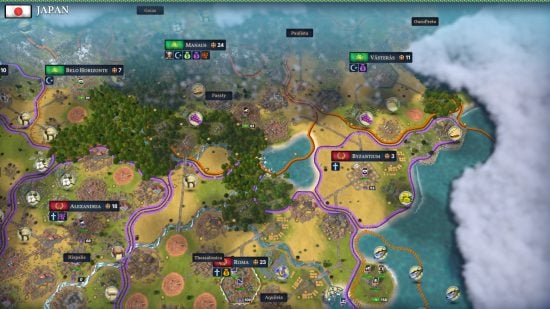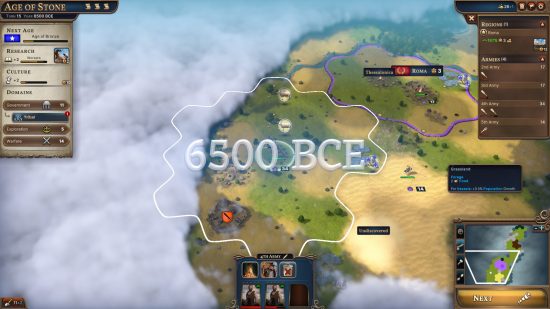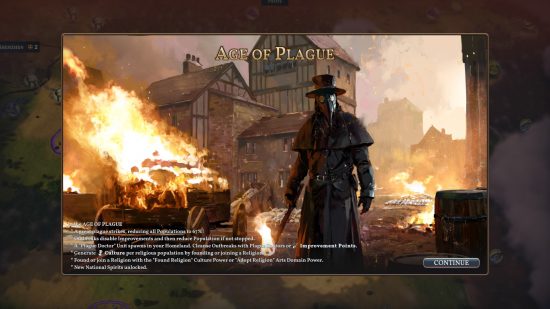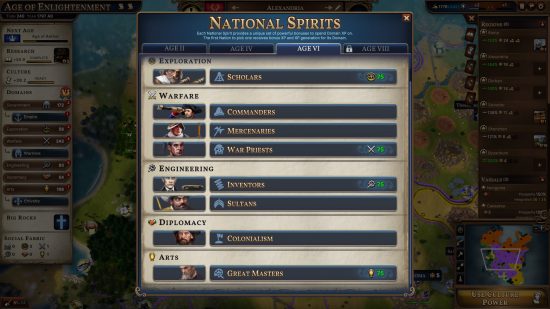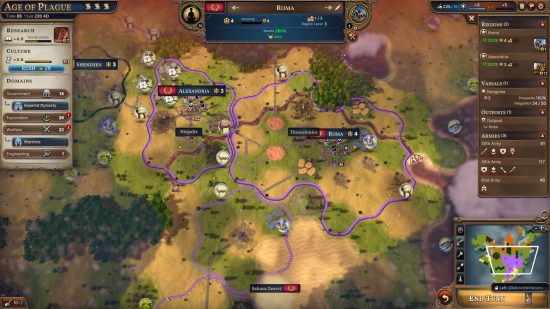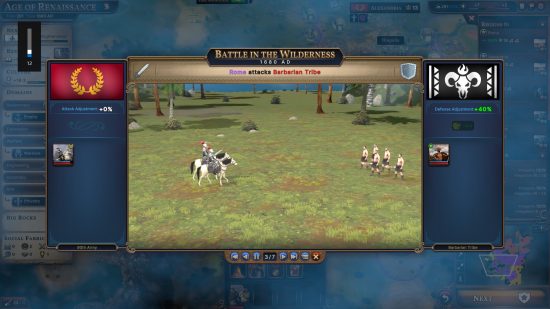Next turn. Next turn. Next turn. Oh god, it’s 2 AM. Sometimes it can feel like a chore to sink hours into a game you’re trying to review. Not so, Millennia, which swallows time the way only a good Civ-like can.
That’s hopefully the highest praise I can bestow upon a turn-based game like C Prompt Games’ Millennia. It completely nails the incremental progression and ‘one more turn’ feeling that forces me to view all such 4x games as a potential menace and a danger to my already besieged sleep schedule.
Millennia is a civilization building strategy game which is full of content and crunchy systems to sink your teeth into. It looks and feels like a Civilization game with several DLCs installed – or, perhaps from the slight jankiness of some of those systems – a bunch of powerful mods bolted on.
However, we must address this off the bat, if it does look like a Civ game, it’d be a Civ game from several decades ago. Millennia is not as pretty as Civ 5, let alone 6, with the unit models in particular leaving a lot to be desired. But while its graphics tech might be from a past era, Millennia’s beelined up the tech tree to unlock ‘good gameplay’.
My favorite thing about this game, after about 15 hours of playtime, is that it’s clearly built with significant variety and customization in mind, which should keep fans happy for multiple playthroughs.
That’s despite it losing one of the key things that gives Civ replay value: nations with unique units, buildings, and bonuses. In Millennia, instead of picking your nation’s character at the start of the game, you’ll mold it, refine it over time, throughout the ages.

Time waits for no Civ
The signature feature of Millennia is its Ages system, which shakes up Millennia’s tech tree with the opportunity to play around in alternate history. So in the late medieval period, if you neglect sanitation you might drift into the Age of Plague. If you do lots of exploring early on you’ll hit an Age of Heroes, but lots of fighting might land you in an Age of Blood.
Different Ages can have entirely different gameplay features. For instance, in the Age of Plague, you have to constantly protect your territories from outbreaks using plague doctors. Meanwhile in the Steampunk-y Age of Aether, you can harvest a new resource from mountain tops to power Victorian airships. It’s not just surface level features that change either, the different periods will also have entirely different tech trees, so there are knock-on effects to entering each era.
In practice, I was unable to push the game into the eras I sought to, but the AI still managed to trigger two variant Ages in my current campaign. After each one of these, the game automatically sets the next Age to the default choice, which prevents things getting too wacky.
Something that’s a bit strange about this system is that once one nation unlocks a new Age, whether default or variant, every other player is forced down the same path, regardless of their playstyle. In fact, some of the age’s features trigger even before you follow them down the path – the sky goes all orangey to show disease is about even if you’re still miles behind in the Iron Age. It seems weird that my entirely sanitary Middle Ages nation should be facing plague just because someone half a world away is struggling.
It’s particularly odd too for the ‘Crisis Ages’ because you have to choose when to research the technology to enter the next Age. It feels weird to be deciding between sweeping up all the Bronze Age techs you’re working on currently, or progressing towards something called the ‘Age of Blood’. Erm, no thank you!
I suppose it would get out of hand quite quickly if everyone could forge their own unique path through the Ages, and this does give an unusual advantage to charging up the tech tree (you get a better shot at picking how the entire world develops). But it would probably be more enjoyable if everyone had the option to customize.
Chivalrous, Spartan, Inventor Romans
Not to worry though, because while Ages provide a lot of Millennia’s variety, it’s the National Spirits that offer up a smorgasbord of choices for the player to select. Essentially, there are five domains that you can earn XP in (Exploration, Warfare, Engineering, Arts, and Diplomacy). That XP can be spent to use different special powers (with more unlocked over the course of the game), or you can plug it into one of your National Spirits, unlocking a tree of different abilities.
These National Spirits are characteristics for your nation, and you get to select a new one every couple of Ages. They each give interesting and unique gameplay options. For instance, Wild Hunters unlock elephant tile improvements, while Khans can work with barbarians.
The Arts National Spirit, Chivalry, gave me a weird range of superpowers, from the ability to spawn crap peasant units that could get upgraded into knights, to the power to make tapestries out of all the cloth I was churning out.
But I had to decide whether to keep upgrading the National Spirit or use the built-in Arts powers everyone gets access to – which include reducing unrest and founding a religion. I was pushing religion quite hard, which meant I neglected the Chivalry tree and invented the Bayeux Tapestry in 1650. See what I mean about the jankiness?
I should mention there’s also a Culture meter that unlocks a wide selection of powers you can use each time you fill it. These range from a sizable research boost to ending all the wars you’re currently fighting. Quite powerful that, because boy does the AI hold a grudge.
An additional sixth domain is your Government. There aren’t National Spirits for Governments, instead you can change your form of Government every few Ages through peaceful or violent revolution.
The Government domain has its own XP and list of important powers (like making settlers) and there’s again a tension between what to spend your resources on. Because each form of Government also itself provides a range of unique units, buildings, and static upgrades which you can spend that XP on. See what I mean about the variety?
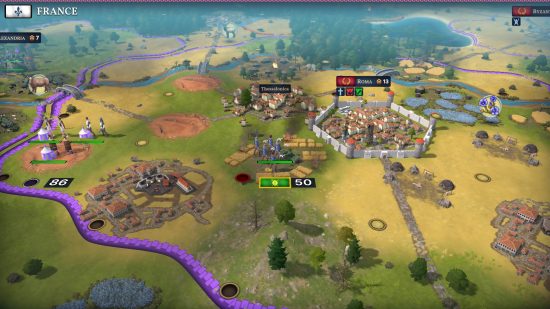
Hell is other people
Millennia certainly isn’t perfect, and the most annoying periods I had playing the game were whenever I had to deal with other nations. They have a frustrating habit of settling right beside you and then, now that you’re neighbors, getting pissy about the proximity and color of your fence, or judgemental about your parking skills. They declared war on me again and again like a swarm of angry bees (the end-all-wars culture power was much used) and it seemed very tough to make friends.
Combat is functional but not interesting. I question C Prompt’s decision to include a little action replay to show what happened after each fight, as this is more a hindrance than a help and I would skip it about 90% of the time. Attacking cities is very tough, and aggressors take a war fatigue penalty that can easily see your own cities fall to riot and uproar, so it was easy to hold out against suicidal enemy forces, but hard to permanently put an end to the constant nuisance. At times it can feel a bit of a grind.
What is nice though, is that the game comes with an undo button, so you don’t have the frustrating feeling of misclicks, or a combat you misjudged, spoiling an hour of gameplay.
Millennia’s UI also takes some getting used to. Published by Paradox, the game has Paradox’s nested tooltips tutorial feature, which I maintain is the best thing to happen to strategy gaming in yonks. However, in Millennia, it’s more temperamental than it should be. Sometimes it’s fiddly, requiring your mouse to be in precisely the right place to access an explanation, and other times no explanation seems to appear.
Similarly, some resources are not shown where you’d expect. Improvement points are wedged way into one corner, but it would seem sensible to have put some other resources down there, especially since there’s no easy way to see how much of each Domain XP you’re generating without a mouse hover.
I want to keep on chattering about Millennia’s many good points though, like its city building system which seems more complex than Civilization’s, requiring you to channel Goods through multiple chains of tile improvements and buildings to get the best effects (wheat becomes flour becomes bread).
Or the Needs requirements as a city gets larger. You start out just needing food, but before long you require housing, sanitation, luxury, religion, and education to keep your settlement growing fast.
I’ve yammered on too long already though, so I’ll wrap things up. With only two-thirds of one playthrough under my belt, I wouldn’t feel comfortable giving Millennia a definitive review score. Perhaps the screen goes black and your PC explodes after 1900 AD. Assuming that that doesn’t happen, however, this is shaping up to be a very strong game indeed.
It’s certainly got a bunch of rough edges which may put off some prospective buyers. However, those edges are there because Millennia has a million different facets. It’s a flawed but lovely gemstone of a grand strategy game, and perhaps one of the finest Civ rivals in years.
